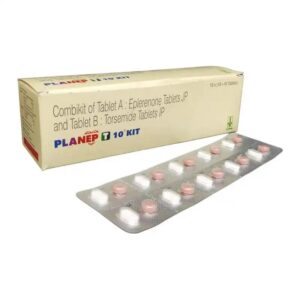TORSEMIDE + EPLERENONE
Torsemide: Torsemide is a medication that belongs to the class of drugs called loop diuretics. It is primarily used to treat edema (fluid retention) associated with conditions such as heart failure, liver disease, or kidney disease. It is also used to treat high blood pressure (hypertension) when other diuretics are not effective.
Torsemide works by inhibiting the reabsorption of sodium and chloride ions in the kidneys. This action prevents the reabsorption of water, leading to increased urine production and elimination of excess fluid from the body.
The usual recommended starting dose for Torsemide is 10-20 mg taken orally once daily. This dose may be adjusted by the healthcare professional based on the patient’s response to treatment. It is important to follow the prescribed dosage and consult with a doctor before making any changes.
Some common side effects of Torsemide may include excessive urination, dizziness, headache, low blood pressure, muscle cramps, or diarrhea. These side effects are generally mild and resolve on their own. However, if they persist or become bothersome, it is advisable to inform a healthcare professional.
In some cases, Torsemide may cause more serious side effects such as an allergic reaction, hearing loss, electrolyte imbalances (low potassium or sodium levels), or liver problems. If any of these symptoms occur, it is important to seek immediate medical attention.
It is important to note that Torsemide can interact with other medications, so it is crucial to inform a healthcare professional about all the medications being taken, including over-the-counter drugs and herbal supplements, to avoid any possible drug interactions.
Overall, Torsemide is an effective medication for treating edema and high blood pressure, but it is essential to follow the prescribed dosage and discuss any concerns or potential side effects with a healthcare professional.
Eplerenone: Eplerenone is a medication that belongs to a class of drugs known as mineralocorticoid receptor antagonists. It is primarily used for the treatment of high blood pressure and heart failure.
The main mechanism of action of Eplerenone is by blocking the action of aldosterone, a hormone that plays a role in regulating salt and water balance in the body. By blocking aldosterone, Eplerenone helps to reduce fluid retention and lower blood pressure.
The typical recommended starting dose of Eplerenone for high blood pressure is 50 milligrams taken once daily. The dose can be increased up to 100 milligrams per day if necessary. For heart failure, the starting dose is usually 25 milligrams once daily, which can be increased to 50 milligrams per day.
Like any medication, Eplerenone can cause side effects. Common side effects may include hyperkalemia (high levels of potassium in the blood), dizziness, fatigue, headache, diarrhea, and nausea. It is important to monitor potassium levels regularly while taking Eplerenone, especially in individuals with kidney problems.
In rare cases, Eplerenone can cause more serious side effects such as liver problems, allergic reactions, and even heart rhythm disturbances. If any of these severe side effects occur, it is important to seek medical attention immediately.
Eplerenone should be used with caution in patients with pre-existing kidney or liver problems, as well as those taking other medications that may increase potassium levels in the blood. It is also not recommended for use in pregnant or breastfeeding women.
Overall, Eplerenone is an effective medication for the treatment of high blood pressure and heart failure. However, it should only be used under the guidance of a healthcare professional who can monitor its effects and manage any potential side effects.

